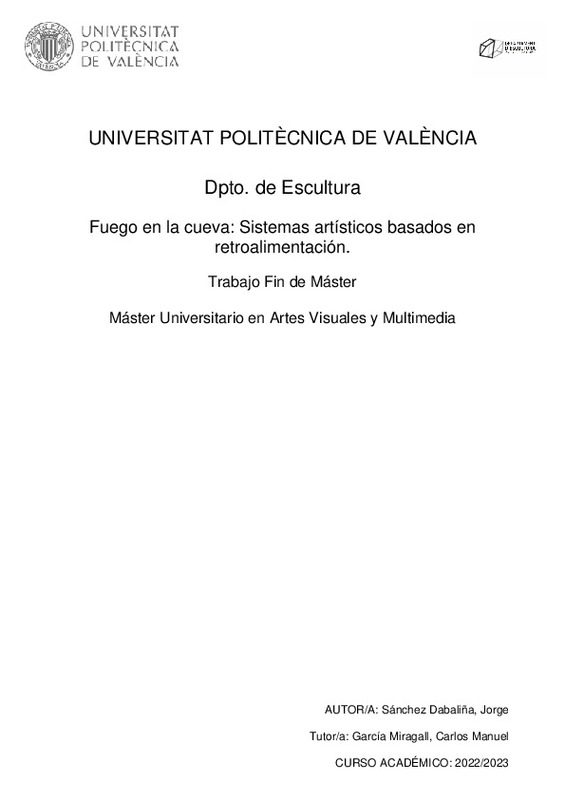JavaScript is disabled for your browser. Some features of this site may not work without it.
Buscar en RiuNet
Listar
Mi cuenta
Estadísticas
Ayuda RiuNet
Admin. UPV
Fuego en la cueva: sistemas artísticos basados en retroalimentación
Mostrar el registro sencillo del ítem
Ficheros en el ítem
| dc.contributor.advisor | García Miragall, Carlos Manuel
|
es_ES |
| dc.contributor.author | Sánchez Dabaliña, Jorge
|
es_ES |
| dc.date.accessioned | 2022-12-30T09:30:59Z | |
| dc.date.available | 2022-12-30T09:30:59Z | |
| dc.date.created | 2022-12-15 | |
| dc.date.issued | 2022-12-30 | es_ES |
| dc.identifier.uri | http://hdl.handle.net/10251/190998 | |
| dc.description.abstract | [ES] El uso de sistemas basados en la retroalimentación en el ámbito artístico se inició en la segunda mitad del siglo XX al calor tanto de la reflexión teórica sobre la cibernética y la teoría de sistemas, como de la experimentación práctica con circuitos analógicos y distintos soportes de grabación. Sus aplicaciones abarcan desde esculturas cibernéticas hasta composiciones musicales, y experimentos audiovisuales que de forma secuenciada fueron produciendo avances muy significativos durante tres décadas consecutivas, siendo a partir de los 70 cuando estos planteamientos comenzaron a utilizarse en el, en ese momento, seminal campo del video arte. En la actualidad, con el fulgurante avance de la tecnología, y la concentración de la gran mayoría de los medios en un único meta-medio: la computadora. Se nos plantea un nuevo encaje a estos planteamientos experimentales donde, por una parte se hace posible la implementación de sistemas más complejos y precisos, al mismo tiempo que se aleja la materialidad de los medios de la práctica artística audiovisual. En este trabajo trazaremos en primer lugar una perspectiva histórica de la retroalimentación en el arte; en segundo lugar, planteamos algunas de las características teóricas que comparten los sistemas de retroalimentación, propondremos una serie de parámetros para el análisis de aplicaciones artísticas en el ámbito audiovisual en las que se ha empleado la retroalimentación y discutiremos algunos de los ejemplos más relevantes. Por último, se describirán y analizarán los tres casos prácticos llevados a cabo. | es_ES |
| dc.description.abstract | [EN] The use of feedback-based systems in the artistic field began in the second half of the 20th century in the heat of both theoretical reflection on cybernetics and systems theory, and practical experimentation with analogue circuits and different recording media. Its applications range from cybernetic sculptures to musical compositions and audiovisual experiments that sequentially produced very significant advances over three consecutive decades, and it was from the 1970s onwards that these approaches began to be used in the then seminal field of video art. Nowadays, with the dazzling advance of technology, and the concentration of the great majority of media in a single meta-medium: the computer. We are faced with a new approach to these experimental approaches where, on the one hand, the implementation of more complex and precise systems is made possible, while at the same time the materiality of the media is distanced from the audiovisual artistic practice. In this paper we will first outline a historical perspective of feedback in art; secondly, we will outline some of the theoretical characteristics shared by feedback systems, propose a series of parameters for the analysis of artistic applications in the audiovisual field in which feedback has been used and discuss some of the most relevant examples. Finally, the three case studies carried out will be described and analysed. Translated with www.DeepL.com/Translator (free version) | es_ES |
| dc.format.extent | 91 | es_ES |
| dc.language | Español | es_ES |
| dc.publisher | Universitat Politècnica de València | es_ES |
| dc.rights | Reserva de todos los derechos | es_ES |
| dc.subject | Cybernetics | es_ES |
| dc.subject | Loops | es_ES |
| dc.subject | Video art | es_ES |
| dc.subject | Feedback | es_ES |
| dc.subject | Cibernética | es_ES |
| dc.subject | Video performance | es_ES |
| dc.subject | Videoarte | es_ES |
| dc.subject | Retroalimentación | es_ES |
| dc.subject | Bucle | es_ES |
| dc.subject.classification | LENGUAJES Y SISTEMAS INFORMATICOS | es_ES |
| dc.subject.other | Máster Universitario en Artes Visuales y Multimedia-Màster Universitari en Arts Visuals i Multimèdia | es_ES |
| dc.title | Fuego en la cueva: sistemas artísticos basados en retroalimentación | es_ES |
| dc.title.alternative | Fire in the cave: Feedback-based art systems. | es_ES |
| dc.title.alternative | Foc en la cueva: Sistemes artístics basats en retroalimentación | es_ES |
| dc.type | Tesis de máster | es_ES |
| dc.rights.accessRights | Abierto | es_ES |
| dc.contributor.affiliation | Universitat Politècnica de València. Departamento de Sistemas Informáticos y Computación - Departament de Sistemes Informàtics i Computació | es_ES |
| dc.description.bibliographicCitation | Sánchez Dabaliña, J. (2022). Fuego en la cueva: sistemas artísticos basados en retroalimentación. Universitat Politècnica de València. http://hdl.handle.net/10251/190998 | es_ES |
| dc.description.accrualMethod | TFGM | es_ES |
| dc.relation.pasarela | TFGM\152198 | es_ES |






